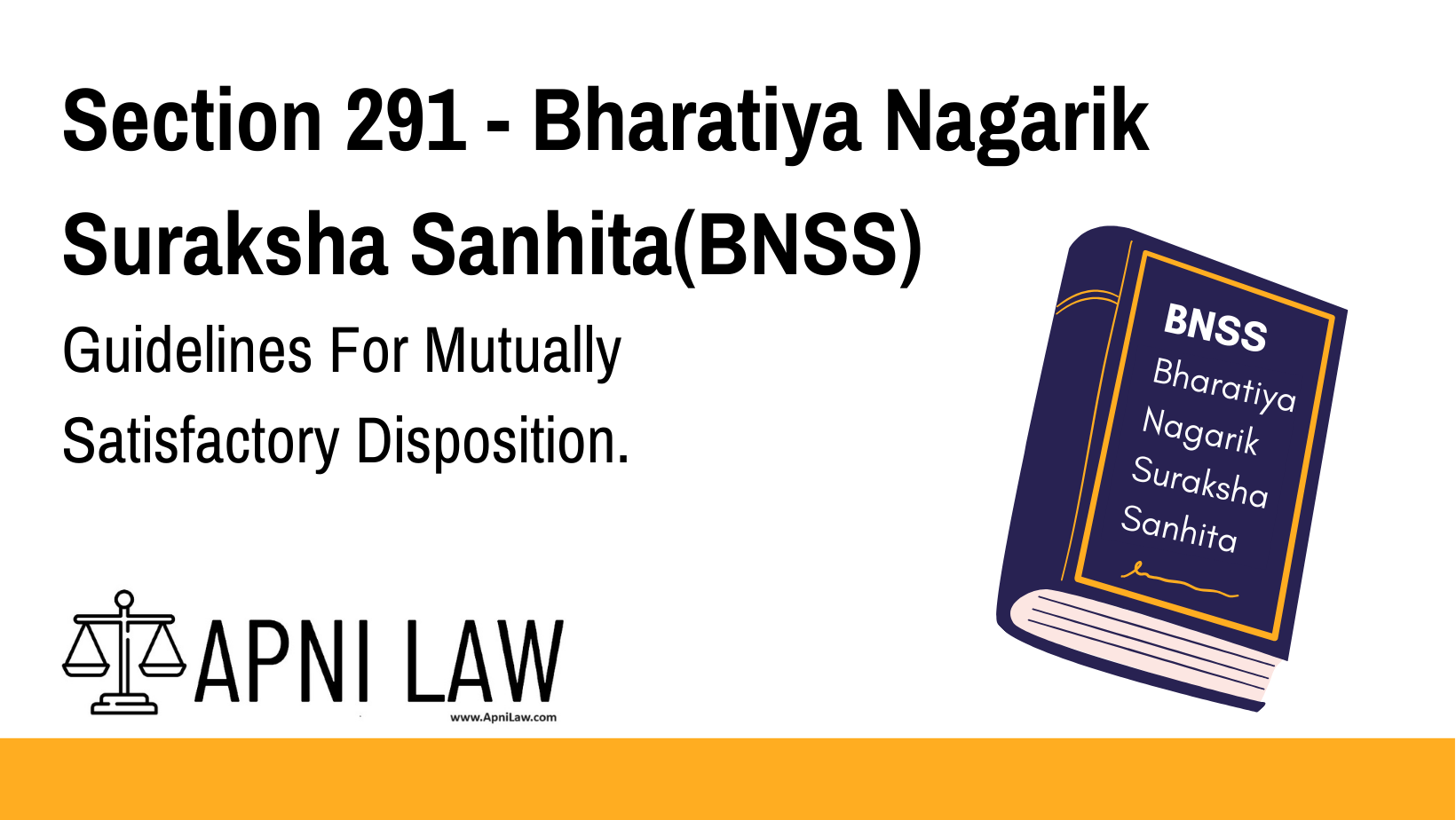Code: Section 291 BNSS
291.
In working out a mutually satisfactory disposition under clause (a) of sub-section (4) of section 290, the Court shall follow the following procedure, namely:—
(a) In a case instituted on a police report, the Court shall issue notice to the Public Prosecutor, the police officer who has investigated the case, the accused, and the victim of the case to participate in the meeting to work out a satisfactory disposition of the case:
Provided that throughout such process of working out a satisfactory disposition of the case, it shall be the duty of the Court to ensure that the entire process is completed voluntarily by the parties participating in the meeting:
Provided further that the accused, if he so desires, may participate in such meeting with his pleader, if any, engaged in the case;
(b) In a case instituted otherwise than on a police report, the Court shall issue notice to the accused and the victim of the case to participate in a meeting to work out a satisfactory disposition of the case:
Provided that it shall be the duty of the Court to ensure, throughout such process of working out a satisfactory disposition of the case, that it is completed voluntarily by the parties participating in the meeting:
Provided further that if the victim of the case or the accused so desires, he may participate in such meeting with his pleader engaged in the case.
Explanation of Section 291 BNSS
This section governs the procedure for a Court to follow when trying to achieve a mutually satisfactory resolution between the parties involved in a criminal case. It explains the steps the Court must take to ensure that the disposition process is voluntary and involves the appropriate parties. The section is divided into two scenarios:
- In a case initiated by a police report:
- The Court must issue notices to:
- The Public Prosecutor
- The police officer who investigated the case
- The accused
- The victim
- The Court must make sure that the disposition process is voluntary and that no participant is coerced.
- The accused may attend with their pleader (lawyer) if they choose to.
- The Court must issue notices to:
- In a case not initiated by a police report:
- The Court issues notices to the accused and victim.
- Again, the Court ensures that the process is voluntary.
- Both the accused and the victim have the right to have a pleader (lawyer) present if they wish.
Illustration
Example 1: Case Initiated by Police Report
A theft case is initiated based on a police report. The Court issues notices to the Public Prosecutor, the investigating officer, the accused, and the victim. They all meet under the guidance of the Court, ensuring the process is voluntary. The accused chooses to have their lawyer (pleader) present during the meeting.
Example 2: Case Not Initiated by Police Report
In a personal injury case where no police report is involved, the Court sends notices to both the accused and the victim. They meet with the Court, and both participants are free to bring their pleaders if desired. The Court ensures that the entire process is voluntary.
Common Questions and Answers on Section 291 BNSS
1. Who is required to participate in the meeting for a police report case?
- Answer: The Public Prosecutor, the police officer who investigated the case, the accused, and the victim must all participate.
2. Can the accused participate in the meeting with legal representation?
- Answer: Yes, the accused can bring their pleader (lawyer) if they wish to have legal representation during the meeting.
3. What happens if the case was not initiated by a police report?
- Answer: The Court will issue notices to both the accused and victim to participate in the meeting, and either party may bring their pleader if they desire.
4. Is the process of working out the disposition voluntary?
- Answer: Yes, the entire process must be voluntary. The Court ensures that no party is forced into agreeing to a resolution.
5. What if the victim or the accused does not want to participate in the meeting?
- Answer: Participation is voluntary, and the Court must ensure that no one is coerced into attending or agreeing to any outcome.
Conclusion
Section 291 lays down the procedure that the Court must follow when trying to reach a mutually satisfactory resolution between the parties involved in a case. It ensures fairness by emphasizing the voluntary nature of the process, providing the opportunity for legal representation, and requiring the Court to make sure that no participant is pressured.








